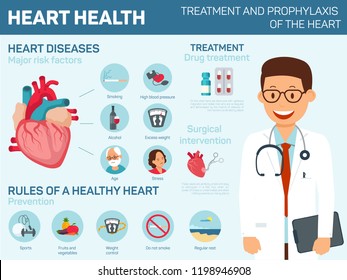What can be done to avoid heart disease?
Heart disease is indeed a primary cause of death. However, this is not an unavoidable condition. While some risk factors, such as family history, gender, and age, are beyond your control, there are many things you can do to lower your chances of developing heart disease. What steps can you take to live a longer and healthier life? If you have never had a heart attack or stroke, these eight crucial characteristics can help you minimize your chance of having one in the future. They are an essential component of an overall healthy lifestyle for adults. Additionally, they can assist you in developing an effective prevention plan with your healthcare team (doctors, nurses, pharmacists, registered dietitians, and other professionals).
1.
Be aware of your
danger.
You can
check your Cholesterol level, your Blood Pressure, and your Medical History
Treatment for Diabetes or Heart Attack to estimate your risk of having a
cardiovascular event in the next ten years if you're between the ages of 40 and
75 and have never had a heart attack or a stroke. Certain factors, such as
smoking, renal disease, or a family history of early heart disease, can raise
your chance of developing heart disease. Knowing your risk factors can assist
you and your healthcare team determine the most appropriate treatment approach
for you and your situation. Many risk factors can be reduced or eliminated by
adopting a healthier lifestyle.
2.
Maintain a healthy
weight through proper nutrition.
Your
eating plan should be focused on vegetables, fruits, whole grains, legumes,
nuts, plant-based proteins, lean animal proteins, and fish as the primary
components of your diet. Make wise decisions, such as reducing refined
carbohydrates, processed meats, and sugary beverages. Use nutrition facts label
on packaged foods to reduce sodium intake, added sugar intake, saturated fat
intake, and trans fat intake.
3.
Engage in some form
of physical activity.
Increase
your physical activity. It's one of the most effective methods to keep healthy,
prevent disease, and age gracefully. Adults should participate in at least 120
minutes of moderate-intensity aerobic activity or 75 minutes of intense
activity per week to maintain a healthy weight. Already physically active?
Increase your level of intensity to reap even more significant advantages from
your efforts. If you are not currently physically active, you can begin by just
sitting less and moving more.
4.
Keep an eye on your
weight.
Maintain
a healthy weight that is appropriate for your body type. If you are overweight
or obese, you should lose weight. Begin by consuming fewer calories and
increasing your physical activity. You may find out your body mass index(BMI).
If you require assistance, consult with your healthcare team about a
weight-loss strategy.
5.
Adopt a tobacco-free
lifestyle.
If you
do not currently smoke, vape, or use tobacco products, you should refrain from
doing so in the future. There is no such thing as a cigarette product that is
entirely risk-free. If quitting smoking or using tobacco is difficult for you,
contact a cardiologist to break the habit using tried and true ways. Don't
simply switch from one tobacco supplier to another. Also, stay away from
second-hand smoke.
6.
Maintain control
over the situation.
Work with
your healthcare team and make lifestyle adjustments if you have high blood
pressure (hypertension), high cholesterol, high blood sugar, or any other
condition that puts you at greater risk for heart disease, stroke, or other
diseases. Many diseases and disorders can be avoided or treated by adopting a
healthier diet, becoming more physically active, decreasing weight, and
stopping smoking.
7.
Take your medication
as prescribed.
Your
doctor may give statins or other medications to help regulate your cholesterol,
blood sugar, and blood pressure if you have a medical condition that requires
it. Take all drugs exactly as prescribed. And it would be best not to use
aspirin as a prophylactic measure unless your doctor instructs you to do so. If
you have never had a heart attack or stroke, taking aspirin every day may not
be beneficial and may even be harmful, increasing your chance of bleeding. If
you had a heart attack or a stroke, your doctor might recommend that you take
aspirin at a low dose to lower your chances of having another one again.
8.
Contribute to the
success of the team.
If you
want to live a longer, healthier life, A Cardiologist doctor can assist you in
lowering your risk of heart disease or stroke. Work on your preventative
strategy as a group. Ask inquiries and be honest about any difficulties you may
be experiencing while attempting to make healthy adjustments. Health and
well-being can be influenced by various factors such as stress and sleep,
mental health, familial conditions, tobacco use and access to food, social
support, among other things.
Live
healthily today to have a healthy future.
What's
the bottom line? Maintaining a healthy lifestyle is a beneficial approach to
delay or prevent many heart and brain problems, which includes staying active
and fit, eating well, abstaining from cigarettes, and managing medical
disorders that can place you at greater risk of heart disease. Take
responsibility for your health. If you want to make changes and develop healthy
habits that you can maintain for the rest of your life, contact Dr. Manohar
Sakhare for further assistance. He is the best Cardiologist in the city, having
more than 20 years of experience. You can reach him at care@yashicaheartcare.com, or
you can visit his website at www.yashicaheartcare.com

Comments
Post a Comment